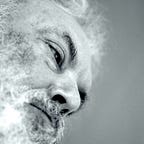What is Spiritual Autonomy?
Spiritual autonomy is the personal path to religion, a religion without ritual, an inner ‘religio.’ It is the fruit of contemplation, not of searching. Its patchwork is creative flow, its artisanal quality a function of spontaneity. It can manifest in all areas of life, as there are no ‘spiritual’ and ‘material’ parts in a life. All is spiritual for the spiritual seeker, all is material for the materialist. Spiritual autonomy is focused on daily life and daily enchanted duties; it is the opposite pole to ideology and organized religion. In its accomplishment, it is simply bliss.
How did I get there? It was a long journey of spiritual dependency before I reached spiritual autonomy, starting with a kind of forced-upon Catholic education (and corresponding ‘educational torture’) in a Catholic home where my mother gave me from age 2 to age 10. While I was baptized Protestant and come from an old Protestant business family from Germany (Wiesbaden), my family had moved to the Saar Region in Germany (at the border to France), which was predominantly Catholic, and my mother said she did not find another shelter for me. (Don’t ask me why she gave me away at all. It’s one of the scars that I will carry not just to my deathbed, but into subsequent lives).
From age 10 to 18, my mother enrolled me in a boarding school that was equally Catholic. (Don’t ask me again why, it was 40 km away from home, but anyway in my case home was never really home. I did not like the pigstall of a dirty place but my contradiction had no effect. It was ‘cheap enough’ so it was good enough).
When I was 18: Kirchenaustritt.* It was enough! No more belonging, no more religion. After finishing my law diplomas in my home town in Germany, and starting my doctorate in Geneva, I was searching for ‘spirituality.’ What did I find? Krishnamurti. Buddhism. And the Tarot. And the I Ching.
(* The legal and legally valid leaving of the Church in Germany, with the consequence that one is freed also of the Church Tax (Kirchensteuer) which is otherwise obligatory for any baptized Christian)
Then came Daoism, the ancient Scholarly Daoism or what some call ‘Integral Spirituality’ or ‘The Universal Way.’ That addiction lasted long, from age 45 to 65, until very recently. After discovering the enormous, and enormously extravagant, and impossible-to-live-by statements/admonitions in the Dao De Jing, I knew this philosophy was just another illusion, just another pseudo-thing, just another make-believe. And … this is not meant to be a judgment about the founder of Daoism, the sage Lao-tzu, for today it is established philological truth that the Dao De Jing was authored by a plethora of Daoist scholars and is thus not the personal testament of Lao-tzu as it was believed in the past.
So then, I just published my last article in my publication ‘The Ancient Chinese Integral Way Tradition.’ It is that, yes, a tradition. But my life is not based on traditions, my piano improvisations neither, nor is my cooking, nor is my photography, nor is my writing style and subjects. My life is based on inspiration, I would say, but verbally this can’t really be expressed. So let me say this instead: my life is the fruit of a contemplative attitude.
And from a contemplative attitude flows naturally a spirituality that is autonomous, in a steadily changing condition, a flow condition …
